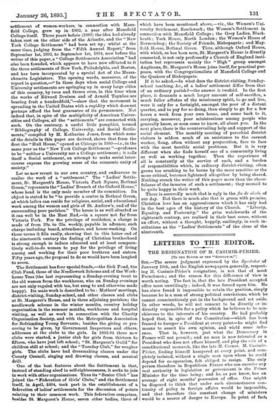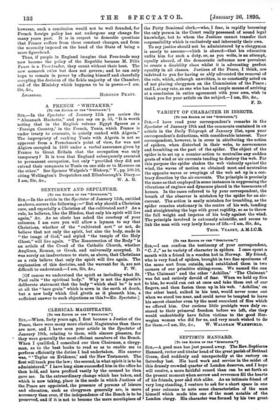LETTERS TO THE EDITOR.
THE RESIGNATION OF M. CASIMIR-PERIER.
[TO THE EDITOR OP THE " SPECTATOR."] SIR,—The severe judgment expressed by the Spectator of January 19th, and the English newspapers generally, respect- ing M. Casimir-Perier's resignation, is not that of most Frenchmen ; and the reason for this difference of view is worth noting. The fact is, that the late President accepted office most unwillingly ; indeed, it was forced upon him. He has since found it impossible to retain the position, simply because he is a man of strong political convictions, which he cannot conscientiously put in the background and set aside. In other words, he will not consent to be directly or in- directly responsible for a policy which he believes to be mis- chievous to the interests of his country. He had probably hoped that, in spite of the Constitution—which has been framed to hamper a President at every point—he might find means to assert his own opinion, and wield some influ- ence. That is, however, just what the Democracy in France will not permit ; and no man is now tolerated as a President who does not efface himself, and play the role of a constitutional monarch, like the late M. Carrot. M. Casimir- Perier, finding himself hampered at every point, and com- pletely isolated, without a single man upon whom he could depend for co-operation, felt obliged to resign. The only person therefore in Republican France who can exercise any real authority in legislation or government is the Prime Minister for the time being; and he, as you know, has an average of eight months' possession of office. One might be disposed to think that under such circumstances con- tinuity of policy in foreign affairs would be impossible, and that therefore this constant change of ministers would be a source of danger to Europe. In point of fact,
however, such a conclusion would not be well founded, for French foreign policy has not undergone any change for many years past. It is in respect to domestic questions that France suffers from these constant changes, and from the necessity imposed on the head of the State of being a mere figurehead.
Thus, if people in England imagine that Free-trade may now become the policy of the Republic because M. Felix Faure is a Free-trader, they count without their host. The new monarch rules but does not govern; and he can only hope to remain in power by effacing himself and cheerfully accepting the decision of the fickle majority of the Chamber, and of the Ministry which happens to be in power.—I am, Sir, &c.,



















































 Previous page
Previous page